C-17 Work to Go to McDonnell’s St. Louis Plant
In another blow to the beleaguered Southern California aerospace industry, McDonnell Douglas is expected to announce today that major components of its C-17 military cargo jet will be produced in St. Louis and not at the company’s plant in Long Beach.
The announcement is in line with McDonnell’s recent policy of moving aircraft component manufacturing out of the Southland. The company insisted Sunday that no existing jobs will be lost in Long Beach.
The decision nonetheless represents the loss of work that might have been done locally because many C-17 parts and tools were made in Long Beach.
The transfer of work is the latest in a series of setbacks for the Douglas Aircraft Co. plant in Long Beach, which in the past year has seen other manufacturing programs shifted to McDonnell facilities around the country.
Missouri Gov. John Ashcroft is scheduled to announce the work transfer today.
Ashcroft and the state’s congressional delegation reportedly have been lobbying the company to find ways to offset a loss of nearly 10,000 McDonnell jobs in St. Louis that have resulted from Pentagon cutbacks, notably the cancellation of the Navy’s A-12 attack jet program this year.
A Douglas Aircraft spokeswoman said the company had chosen St. Louis to manufacture “major components” of the C-17 military cargo jet, including the cargo door and ramp. The spokeswoman estimated that the decision meant 1,000 to 2,000 new jobs in St. Louis.
John F. Shirey, Long Beach assistant city manager, said the aerospace company had informed city officials a few weeks ago that “they would be shifting work to St. Louis, but they assured us no jobs in Long Beach would be lost.”
He also noted that McDonnell told Long Beach officials not to expect “increased employment levels in the near term.”
Acknowledging that the city was disappointed at McDonnell’s decision, Shirey said: “We just hope they don’t shift any jobs from Long Beach to St. Louis.” If that occurred, “we’d be very upset,” he said.
The Douglas plant in Long Beach has lost more than 7,000 employees in the last year, since it began divesting assets and transfering operations in an effort to focus on the final assembly of aircraft.
It is unclear what the affected workers will do once their jobs are shifted to St. Louis. A Douglas spokesman said the workers could transfer to other jobs on the C-17 program or the MD-11 and MD-80 commercial airliner programs, which are gearing up for increased production.
Earlier this year, McDonnell moved a portion of its MD-80 jetliner production from Long Beach to a facility in Salt Lake City. Before that, it had moved the Navy T-45 trainer jet program, with 1,800 jobs, to St. Louis.
A report in Sunday’s St. Louis Post-Dispatch, citing an unidentified source, said McDonnell Douglas would receive a $14-million package of low-interest loans and job retraining funds from the state to relocate the C-17 work to Missouri.
McDonnell’s move is the most recent example of the beating that the aerospace industry has been taking in Southern California.
Within the past year, Lockheed decided to move production of its advanced tactical fighter to Georgia. McDonnell Douglas has reached a preliminary decision to shift production of its next jetliner, the MD-12X, to another state.
In addition, Northrop’s B-2 bomber program, on which 35,000 California jobs depend, faces a continuing political threat.
A study by the consulting firm McKinsey & Co. released two months ago warned that the exodus of the aerospace industry threatens to inflict broad economic damage on California. Over the past four years, the state has lost 60,000 aerospace jobs, the study found.
Overall, the aerospace industry accounts for between 1.2 million to 1.4 million jobs in the state, the study said.
The report said the leading reasons for the exodus from California were high wages and housing prices and the environmental costs of doing business in the state. The study also cited lack of political will, finding that California’s congressional delegation ranks at the bottom of major aerospace states in support of the industry.
More to Read
Inside the business of entertainment
The Wide Shot brings you news, analysis and insights on everything from streaming wars to production — and what it all means for the future.
You may occasionally receive promotional content from the Los Angeles Times.










